- Home
- B. V. Larson
Star Force 10: Outcast Page 12
Star Force 10: Outcast Read online
Page 12
Using our final day, we tested the new partial shields and how they worked with the weapons. Marvin flew Greyhound, leading the thirty-six missiles in circles.
The Pandas made no further moves, except for continuing to beam us an automated message that kept demanding we come to dinner. Now I understood what they meant when they said they would like to honor and dine with us: they wanted our heads on the platters. The entire incident underlined the risks of using translation software.
As we were out of time, I ordered Valiant and Greyhound to rendezvous and we refueled Marvin’s ship. We set course for the gas giant, Tullax 5, where the ring waited. It was the only exit out of the Panda system, and we all hoped that it would function for us when we got there.
On the way, we continued to modify Valiant. The next part of my plan was to order the improvement of all of our motive systems—engines, repellers, inertial stabilizing fields—to allow us a big burst of acceleration. Extra generators and capacitor batteries to store the energy were also added. We had to expand the hull in spots to make room, turning the graceful manta ray shape of the ship into more of a sea turtle. It wasn’t pretty, and the way the ship handled would suffer, but for my plan to work, we needed all the hardcore acceleration we could get. When Dad modified a ship like this in the old days, he said it was like taking a European sports car and turning it into an American muscle machine. Now I knew exactly what he meant.
During this time, I didn’t see as much of Adrienne as I’d have liked. Don’t get me wrong, I wasn’t chasing her or vice versa, but a smart, capable and familiar companion at meals made a welcome change from all the earnest military people. The crew wanted to believe in me, in the Riggs mystique, and I didn't want to let them down. But I was just an ensign after all, and I was obviously coloring way outside the lines. Only the fact that I wasn’t leading them straight into pointless danger kept them confident, that and our decisive escape from the Panda attack. I kept telling them the truth, which is always a plus: our job was to survive and get home. Even if that was all we did, the new star maps we’d take back to Earth would be incredibly valuable.
I’d had the dead officers’ cabins cleaned out and their effects stored, in case we ever got back home. I gave Adrienne one of the cabins and took another for myself. I left the captain’s quarters untouched aside from boxing up his possessions and shoving them in the lockers. I didn’t think the crew was ready for me to move in there.
I talked to Adrienne about her uncle and how sorry I was for her loss. She told me she didn’t blame me, and I felt our relationship improving. We shared mealtimes in her cabin. She gave me good advice and insight, and I realized it was important to have someone nearby who wasn’t under my direct command—someone who could speak her mind without worrying about her career or petty politics. You’d think people would forget about all that stuff when enemies were all around, but human nature just didn’t work that way.
I found that I really needed to talk to a friend to get me through the long hours filled with work and worry. Sometimes in my exhausted dreams, I wasn’t sure whether it was Olivia’s or Adrienne’s face I saw.
We talked about how I had nanotized her to save her life, and she understood. Everyone aboard was now nanotized, even the few surviving civilians. When they had argued with me about getting it done, I’d led them down to the improvised morgue and showed them the bodies of their dead colleagues. Then I jumped into a medical bay for booster nanites, making a show of how easy it was. Despite the pain, I sat rigidly and kept inside the howls that wanted to escape my lungs.
After that, they’d been mildly shamed. They climbed into the machines semi-voluntarily under my marines’ watchful eyes and suffered through it. As always, the treatments provided hours of agony. I left just as they began cursing my family name in earnest and pretended not to hear.
“Sir?” came a call as I left the scientists to their torment. “Bridge calling. Warrant Officer Hansen on watch.”
“What is it, Hansen?”
“The Pandas have finally made a move. They’re on our screens and closing fast. They’ll intercept us just as we reach Tullax 5.”
I released a string of curses. “Are they launching from that battle station on Tullax 5?”
“No sir. They appear to have come from the alien home world. They circled around the star, using its gravitational pull to slingshot them to greater speed and surprise us.”
“How many ships?”
“Thirty-six.”
“Of course. Maintain course and speed. Riggs out.”
I hurried to the central factory, which was now churning out munitions. It was my final preparation, one I wasn’t sure would work. I’d ordered the machine to build small, simple mini-missiles. They had no warhead, just a tiny radiation source to fool sensors into thinking they were nukes. The motive force would be one repeller, like on a marine skateboard or in a battlesuit.
Normally repellers were much too slow and weak compared to engines, but they had the advantage of using much less fuel and space. A generator, a repeller, a sensor package and a tiny brainbox basically made up each missile. There wasn’t time to test them thoroughly but during the final hours, I fired off a few prototypes. They worked well, and I had the factory spew out as many as it could make, which turned out to be about a hundred per hour. Once we had four hundred of them, I was ready to put my plan into motion.
-13-
By the time we were closing in on Tullax 5, I wouldn’t say we were ready, but we’d done what we could. It had taken some maneuvering, and I hadn’t fully explained what was going to happen to my crewmen, but they were all too busy to complain. I’d never liked meetings, so other than the duty watch, it was just me, Hansen and Kwon around the bridge holotank as the battle began. I’d deliberately excluded the scientists. They would debate everything endlessly if I’d let them loose on the command deck.
Adrienne had slipped onto the bridge, the only non-military person in sight. She sat down near enough to listen in, and I didn’t have the heart to order her away. I guess because I’d included her in the manufacturing and crash repairs, making good use of her engineering degrees, she figured she was part of the command staff now. Fair enough, I figured. If I was lucky, she could become my technical liaison, my eyes and ears among the geeks. She did seem very well-liked by the technical staff.
“Let’s get a status report,” I said. “What’s with those thirty-six Panda ships? I can see on the display they’ve slowed down.”
“Yes sir,” Hansen said.
“Why?”
Hansen shrugged. “Not sure. I thought maybe you could tell us what the enemy was thinking.”
I stared at him coldly for a moment then nodded. “I’ll do my best. I would wager they think we’ll slam into their battle station and die on their guns. Why risk losing a few cruisers in battle if they can take the damage on a tougher station?”
“Why indeed?” Hansen asked. “I’m beginning to admire their strategic thinking.”
“All right,” I said. “If they’re hanging back to play clean up, it’s all about us and the battle station. In fact, it makes it even more imperative that this plan works.”
“Because otherwise,” Hansen said, “we’re dead. The Panda ships will sweep in and blow us away from behind—if we’re so lucky as to survive that long.”
“We will,” I assured him. “Valiant is lined up on the open part of the ring sticking out of the moon of Tullax 5—or at least lined up on where it will be at the moment we pass through it. I’m hoping that as we approach, our intentions won’t be obvious until the last minute. All we have to do now is accelerate.”
“That’s still going to be some tricky piloting,” Hansen said. “Getting the timing right…”
“Are you saying you can’t do it?” I asked quickly.
The grizzled veteran’s lip pulled back. “I can do it. But if I miss and we all die, don’t say I didn’t warn you.”
“I won’t say a word,” I s
aid, smiling tightly.
“But how are we going to get past that battle station?” Kwon asked suddenly, leaning his bulky body forward over the command displays. “I was thinking maybe we’d have to land troops on it—or something.”
I could tell he was disappointed he wasn’t going to get the chance to kick some Panda ass in person.
“Don’t worry,” I told him. “I’ll have something for you and your marines to do, but before I get to that…” I brought up the holotank’s planning function and started a script I’d written. “Once we accelerate to cruising speed, we’ll launch our mini-missiles in a cloud toward the battle station.”
“What about our regular missiles?” Hansen asked. “What about the Panda fleets? The logical thing to do is to hit both forces and send a full spread in behind the little ones.”
The warrant officer was referring to our nuclear-tipped ship-killers. If enough of them got through, they could take down the battle station or at least tear it up badly.
“No,” I said. “First off, we don’t have a lot of them aboard and I don’t want to use up our supply of radioactives—we’re not home yet, and I want to hang on to critical materials. Secondly, I want to keep casualties between us and other biotics to a minimum, no matter how abhorrent their customs. Third, we don’t know exactly what that battle station is defending the Pandas against, but I suspect something serious is on the far side of that ring. If we take down their fortress, whatever is on the other side of the ring might pour though and destroy the Pandas.”
“Killing Pandas?” Kwon asked. “That sounds like a pretty good idea to me, sir.”
“What if the enemy they fear is even worse?” I demanded.
Kwon snorted. “They ate our officers!”
“I know,” I said. “But crazy as it sounds, that may be how they exchange ambassadors or receive visitors in their culture. No, we have to escape with minimum damage to either side and move on to locate more rings. That’s the only way to get home.”
Kwon fell silent. I glanced at Hansen, but he didn’t offer anything new.
“On the other hand,” I continued, “if some of our mini-missiles do strike home, I won’t lose any sleep over it. Their job is primarily to provide a distraction. Hopefully, the battle station will use its weapons to take out the threat rather than trying to stop us from going through the ring. They’ll have no way of knowing those missiles aren’t nuclear-tipped.”
“Okay, but what about the other things you did to my ship?” Hansen asked.
My expression hardened. I’d given the man a lot of leeway as the local expert, and I was a very junior officer, but I wasn’t going to let him get away with thinking he was in charge. Divided command was a recipe for disaster. “It’s not your ship, Hansen. It’s our ship, or it’s my ship. Forget that, and we’re going to have a serious disagreement which will end badly.” My eyes bored into him long enough to see him back down. Then I threw him a bone, lowering my voice, as everyone else on the bridge was listening. I said, “We have to stick together on this, Chief, for everyone’s sake.”
He nodded, his lips drawn together in a thin line, and I resolved to keep a close eye on him.
“Now,” I spoke more loudly, “the extra engine power is so we can goose it and speed through the ring faster than they think we can. The Pandas have seen this ship’s performance as we ran from their squadron, so they will be calibrated for what they expect. Hopefully that will throw their aim off enough to allow us to zoom by.”
“What about the new shield generators?” Hansen asked.
“We’ll use them to double up on shield power. Two layers will cover most of the ship, and we’ll drop the outer screen and be able to fire the main beams if we have to.”
“So…what about my marines?” Kwon asked.
“How many do you have left?”
“Thirty-two,” he replied.
I nodded. “That’s good. Adrienne, get down to the troop pod and do a count on our serviceable skateboards. They’ll each need a sensor package, a steerable repeller, a radio receiver and a tiny nuke. Use the minimum amount of radioactives, and make them out of solid steel so there is more mass to blast in all directions if they blow. We’ll sync them up with the suits, and each marine will control one with his own HUD. We’re going to send them out in front of us in space.”
“What will that do?” Kwon asked. “Do you think maybe we’re Centaurs? Am I getting the joy of blowing myself up?”
“I thought you wanted to get into this battle,” I said.
Kwon grunted unhappily, but said nothing more. I was glad he didn’t go up against me on this. I was having enough trouble with Hansen. I could see now why Dad had always liked Kwon—he followed orders.
“Get started on configuring those invasion systems,” I said, “and get them slaved to the marine suits.”
Once they’d left, I turned to Hansen and explained the other part of the plan. After some thought and a few tweaks, he agreed it was a good one. We started working on scripting the ship’s brainboxes for as many contingencies as possible.
Murphy’s Law, or “Sod’s Law” as Adrienne said it was known in the UK, states that whatever can go wrong, will. Then there’s the old adage about no battle plan surviving contact with the enemy. Both of them seemed to apply when it came to Marvin. Just a few minutes later, Hansen spoke up from the helm. “Sir, I’m having trouble getting confirmation of the script from Greyhound. The brainbox is not responding.”
That annoyed me because the yacht and the missiles that were still mindlessly following it were an important addition to my plan. Not only that, I wanted to install that third shield generator on Greyhound. This far from home, the flexibility of having an extra, fast little ship might be critical.
“Try hailing Marvin directly,” I said. Thinking about it, I realized several days had gone by since I had spoken to him. That couldn’t be a good thing. Whenever he fell silent, I had to wonder if he wasn’t cooking something up that he knew I wouldn’t like. I probably should have had Kwon drag him aboard Valiant when I'd had the chance.
A video stream came to life on my console. Marvin appeared with only a few seconds delay.
“Hello, Captain Riggs,” the robot said.
“I’m not a captain, Marvin. I’m just an ensign.”
“By naval tradition, the officer in charge of any ship is given the courtesy title of Captain, no matter his rank. Therefore, you may call me ‘Captain Marvin.’”
I paused, startled at this sudden conversational turn, and almost exploded in anger before realizing that I had to out-think and out-reason Marvin if I was going to regain control of the situation. Obviously he had somehow talked himself into seizing Greyhound. Given how far away he was and his ability to outrun us, I had no direct way to enforce my will upon him.
“I’ll call you Captain,” I said carefully, “if you can convince me your claim to that title is legitimate.”
“Space salvage law says that any party may take possession of abandoned property.”
“Greyhound is not abandoned property, Marvin.”
“On the contrary, it became abandoned when Adrienne Turnbull, its owner’s legal proxy, departed.”
I crossed my arms, racking my brain for what I remembered of my classes on space law. “To be salvaged, a vessel must be abandoned by everyone, correct? Otherwise, a ship could be seized on a technicality if all the officers or owners happened to leave. In other words, it has to be empty and unattended to become salvage.”
All Marvin’s cameras, which seemed to have multiplied to at least a dozen, now focused on me, or at least on my image aboard Greyhound. “I believe that is correct,” he said cautiously.
“But you are a citizen of Earth, as you have asserted before, and you were aboard the whole time. Ergo, the ship was not salvage and you’re not the new owner, nor the Captain.”
There was a certain degree of triumph in my voice as I finished my declaration. I knew I had him, and it had been rather
neatly done at that.
His cameras drifted listlessly. “I'm experiencing immense disappointment. I think it is what you think of as—sadness. I’ve always wanted to be a ship captain.”
“Marvin,” I snapped, “Are you blocking our access to Greyhound’s brainbox?”
“No.” His tentacles began to fidget.
Not liking that one-word answer, I pressed him. “Then why can’t we reach it?”
“Define ‘it.’”
“By ‘it,’ I mean Greyhound’s brainbox!” I said, my voice rising. “Put me in contact with the ship!”
Marvin’s many tentacles rustled and moved like a nest of nervous snakes. “Captain Riggs, you’re already talking to it.”
“What?” Then I got it. “Marvin, did you take over the brainbox? Did you incorporate it into yourself?”
“I believed I was Captain. It seemed irrational not to do so.”
Finally, I realized how clever Marvin had been. Unless I wanted to manufacture and program a fresh brainbox in the middle of a combat situation, I was stuck with treating Marvin like Greyhound’s controller. So he ended up being the captain anyway. Now I had to find a way to make that work for me.
“Okay, Marvin. According to Star Force regulations and Earth space law, Fleet can commandeer civilian vessels at need by order of the senior officer on site. That’s me, and Greyhound is hereby commandeered and placed under Fleet command. By my authority, I am appointing you a temporary warrant officer in Star Force with all the privileges and responsibilities thereto.”
“Will I be paid?” Marvin asked.
“Of course, though it will be a while until any of us collects our paychecks.”
“Then I accept.” All of his cameras and tentacles rose up into a position I would have called “jaunty.” I wondered if he had maneuvered me into this action or if it had just been an acceptable fallback plan of his.

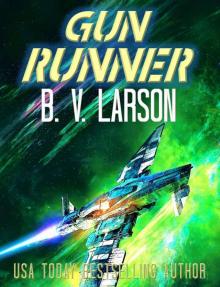 Gun Runner
Gun Runner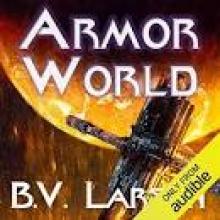 Armor World
Armor World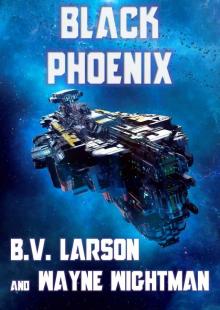 Black Phoenix
Black Phoenix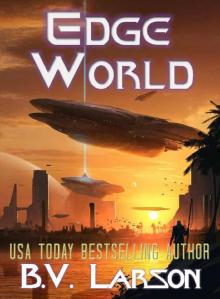 Edge World (Undying Mercenaries Series Book 14)
Edge World (Undying Mercenaries Series Book 14)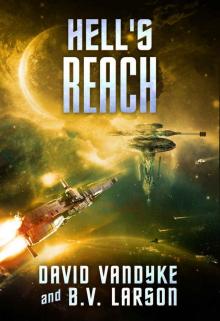 Hell's Reach (Galactic Liberation Series Book 6)
Hell's Reach (Galactic Liberation Series Book 6)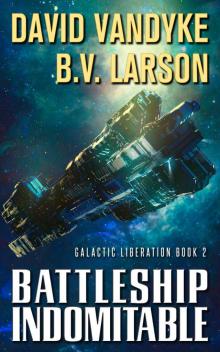 Battleship Indomitable
Battleship Indomitable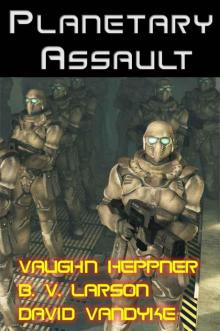 Planetary Assault (Star Force Series)
Planetary Assault (Star Force Series)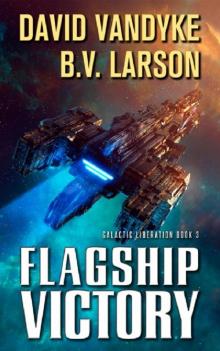 Flagship Victory (Galactic Liberation Book 3)
Flagship Victory (Galactic Liberation Book 3)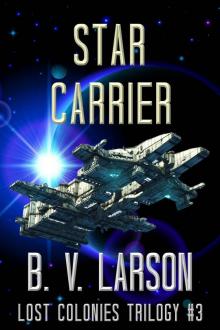 Star Carrier (Lost Colonies Trilogy Book 3)
Star Carrier (Lost Colonies Trilogy Book 3)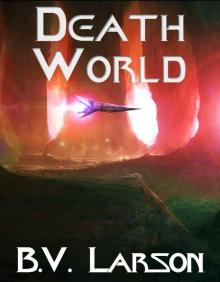 Death World (Undying Mercenaries Series Book 5)
Death World (Undying Mercenaries Series Book 5)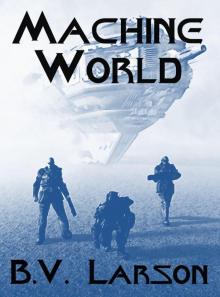 Machine World (Undying Mercenaries Book 4)
Machine World (Undying Mercenaries Book 4) Mech 2
Mech 2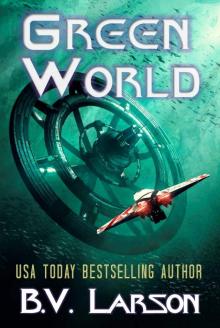 Green World
Green World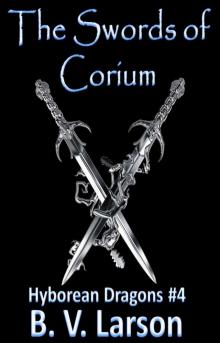 The Swords of Corium
The Swords of Corium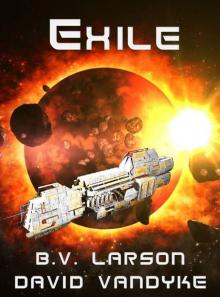 Star Force 11: Exile
Star Force 11: Exile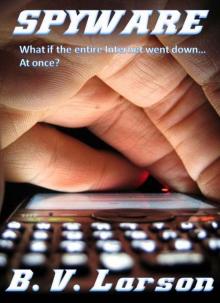 SPYWARE BOOK
SPYWARE BOOK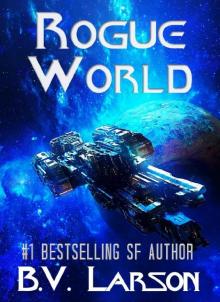 Rogue World (Undying Mercenaries Series Book 7)
Rogue World (Undying Mercenaries Series Book 7)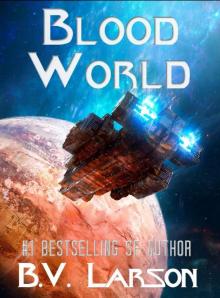 Blood World (Undying Mercenaries Series Book 8)
Blood World (Undying Mercenaries Series Book 8)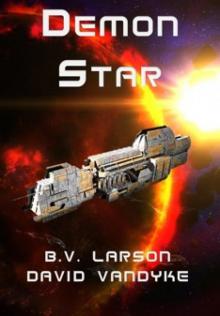 Demon Star
Demon Star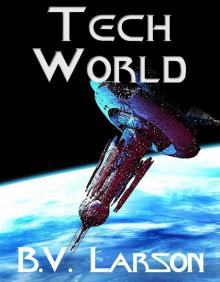 Tech World (Undying Mercenaries Series)
Tech World (Undying Mercenaries Series)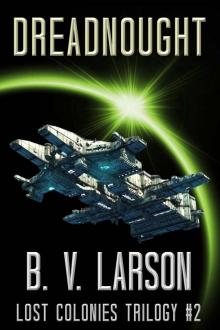 Dreadnought (Lost Colonies Trilogy Book 2)
Dreadnought (Lost Colonies Trilogy Book 2) Shifting
Shifting To Dream with the Dragons (Hyborean Dragons)
To Dream with the Dragons (Hyborean Dragons)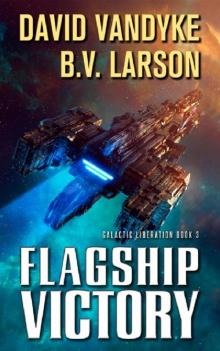 Flagship Victory
Flagship Victory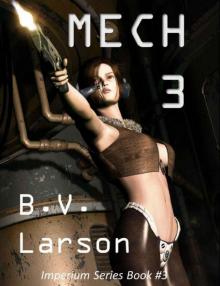 Mech 3: The Empress
Mech 3: The Empress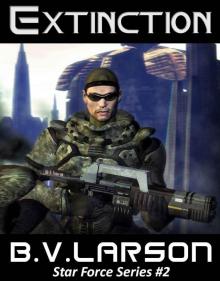 Extinction Ebook Full
Extinction Ebook Full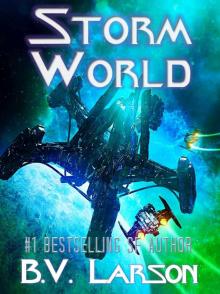 Storm World (Undying Mercenaries Series Book 10)
Storm World (Undying Mercenaries Series Book 10)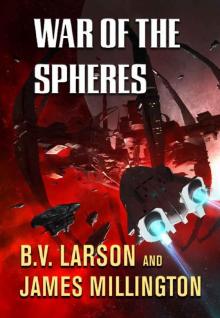 War of the Spheres
War of the Spheres MECH EBOOK
MECH EBOOK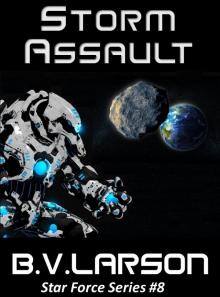 Storm Assault (Star Force Series)
Storm Assault (Star Force Series)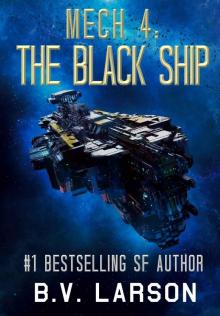 Mech 4: The Black Ship (Imperium Series Book 5)
Mech 4: The Black Ship (Imperium Series Book 5)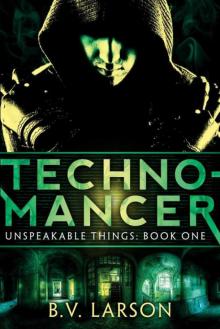 Technomancer
Technomancer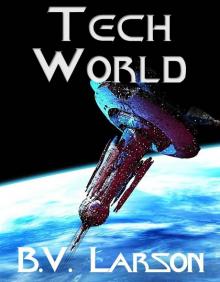 Tech World
Tech World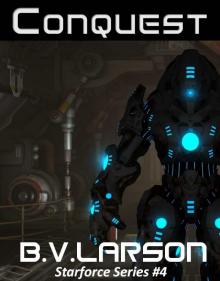 Conquest (Star Force Series)
Conquest (Star Force Series)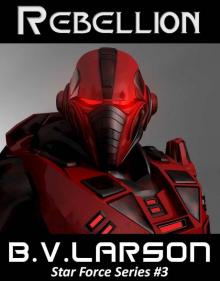 Rebellion sf-3
Rebellion sf-3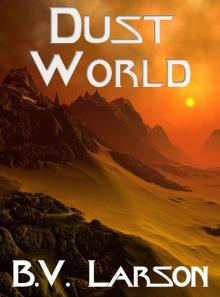 Dust World
Dust World The Dragon Wicked
The Dragon Wicked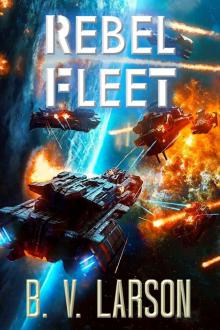 Rebel Fleet
Rebel Fleet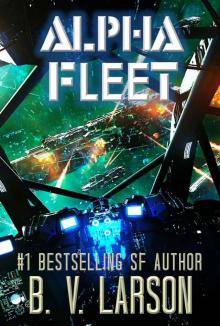 Alpha Fleet (Rebel Fleet Series Book 3)
Alpha Fleet (Rebel Fleet Series Book 3)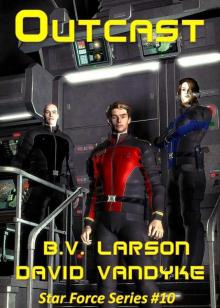 Star Force 10: Outcast
Star Force 10: Outcast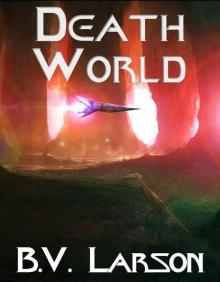 Death World
Death World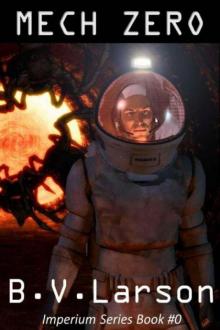 Mech Zero: The Dominant
Mech Zero: The Dominant The Sorcerer's Bane
The Sorcerer's Bane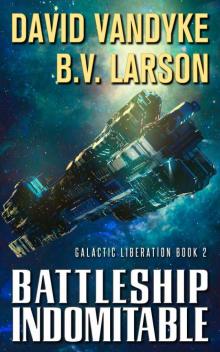 Battleship Indomitable (Galactic Liberation Book 2)
Battleship Indomitable (Galactic Liberation Book 2) Haven Magic
Haven Magic Amber Magic (Haven Series #1)
Amber Magic (Haven Series #1)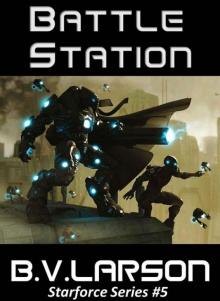 Battle Station sf-5
Battle Station sf-5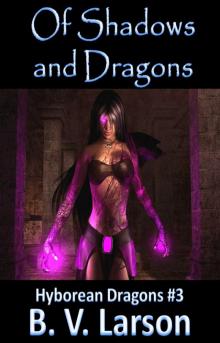 Of Shadows and Dragons
Of Shadows and Dragons Starfire
Starfire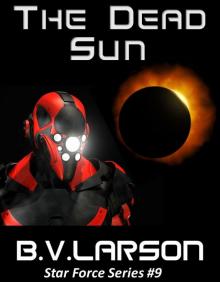 The Dead Sun (Star Force Series)
The Dead Sun (Star Force Series) Home World (Undying Mercenaries Series Book 6)
Home World (Undying Mercenaries Series Book 6)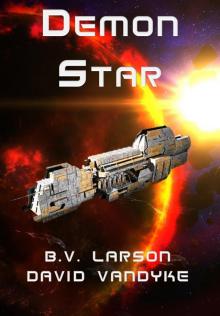 Star Force 12 Demon Star
Star Force 12 Demon Star Dream Magic
Dream Magic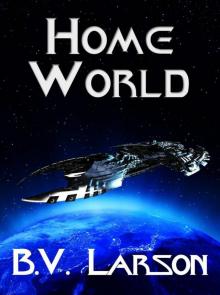 Home World
Home World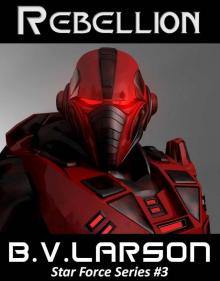 Rebellion Ebook Full
Rebellion Ebook Full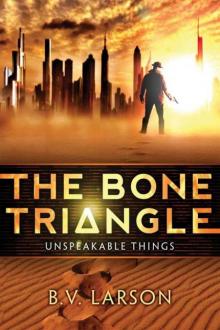 The Bone Triangle
The Bone Triangle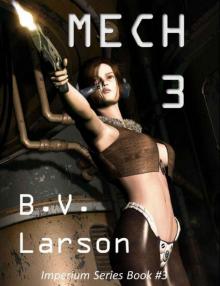 The Empress i-3
The Empress i-3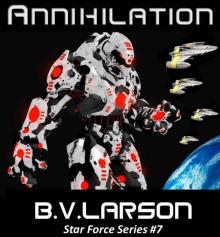 Annihilation (Star Force Series)
Annihilation (Star Force Series)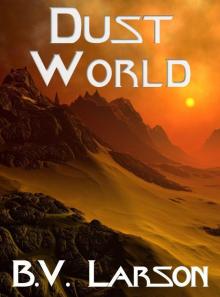 Undying Mercenaries 2: Dust World
Undying Mercenaries 2: Dust World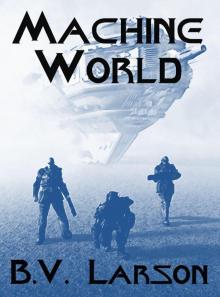 Machine World
Machine World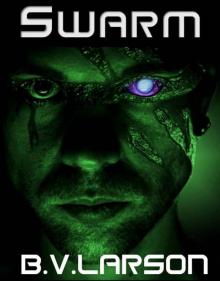 Swarm
Swarm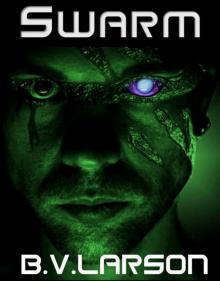 Swarm sf-1
Swarm sf-1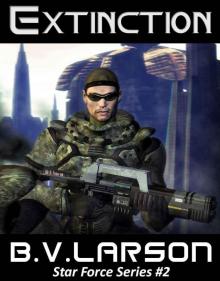 Extinction sf-2
Extinction sf-2 Amber Magic h-1
Amber Magic h-1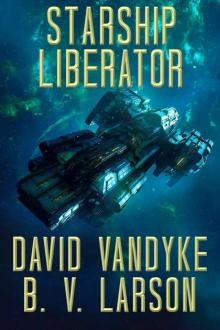 Starship Liberator
Starship Liberator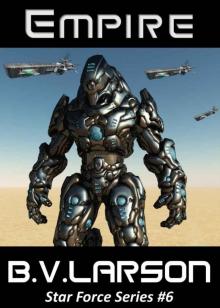 Empire Ebook Full
Empire Ebook Full The Dragon-Child
The Dragon-Child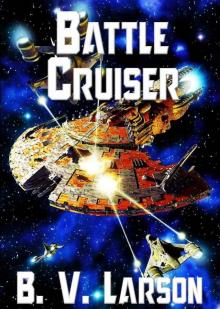 Battle Cruiser
Battle Cruiser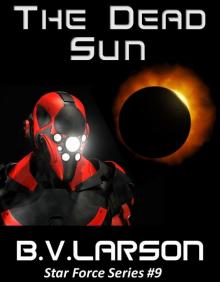 The Dead Sun
The Dead Sun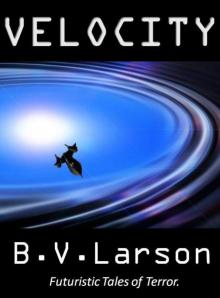 Velocity
Velocity Creatures
Creatures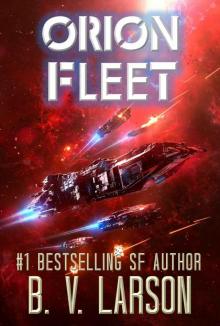 Orion Fleet (Rebel Fleet Series Book 2)
Orion Fleet (Rebel Fleet Series Book 2)